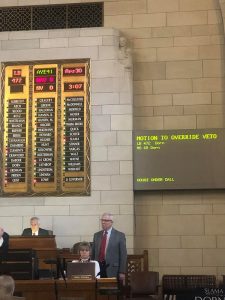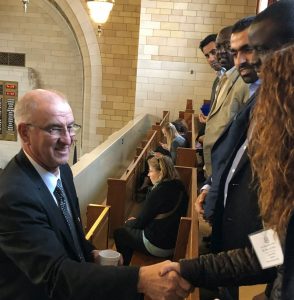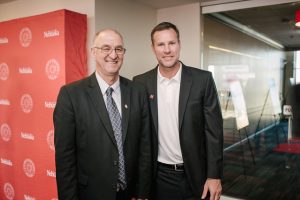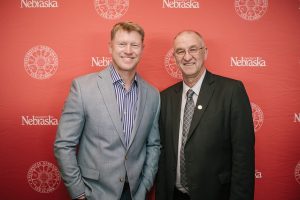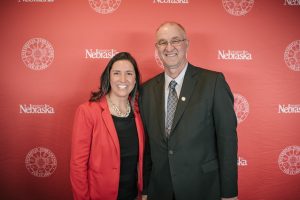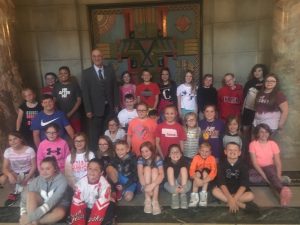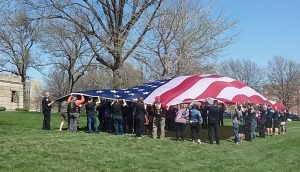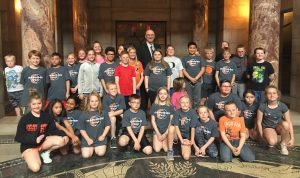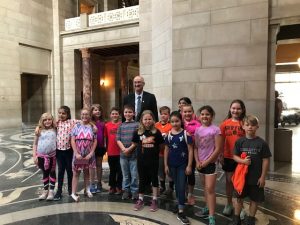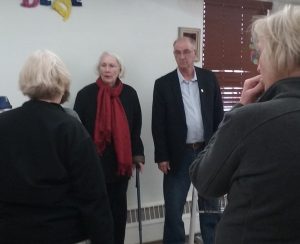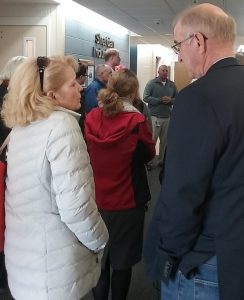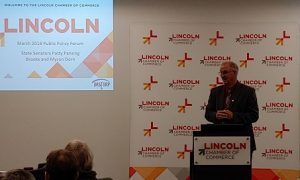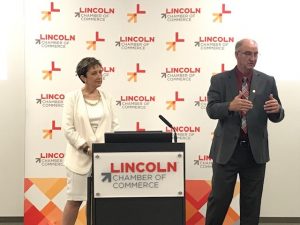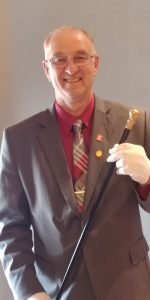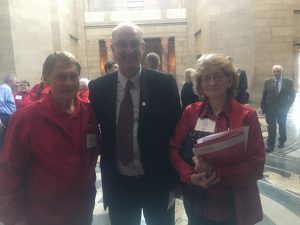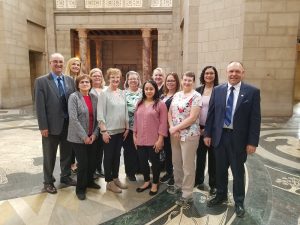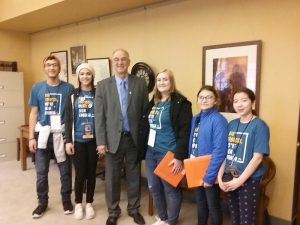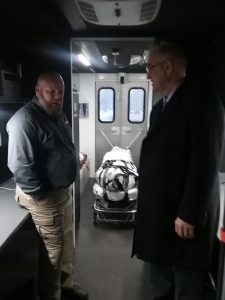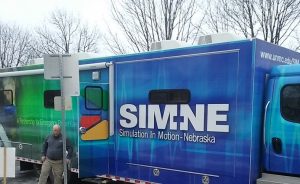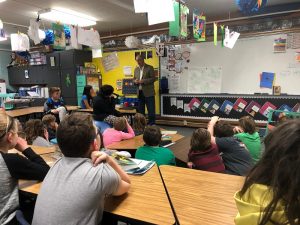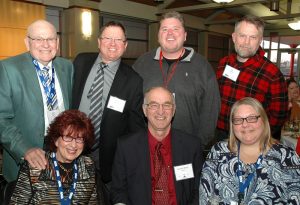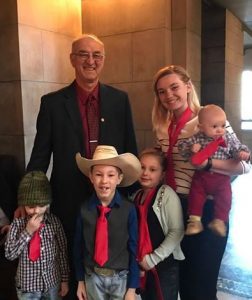NEBRASKA LEGISLATURE
The official site of the Nebraska Unicameral Legislature

Sen. Myron Dorn
District 30
The content of these pages is developed and maintained by, and is the sole responsibility of, the individual senator's office and may not reflect the views of the Nebraska Legislature. Questions and comments about the content should be directed to the senator's office at mdorn@leg.ne.gov
August 30th, 2019
LINCOLN – Three of Nebraska’s Senators, Wendy DeBoer of District 10, Myron Dorn of District 30, and Lynne Walz of District 15, were among 36 select legislators to complete a leadership training program that identifies and assists emerging state and provincial leaders in the Midwest.
DeBoer, Dorn, and Walz met with lawmakers from ten other states and three Canadian provinces on August 9-13, in Minneapolis, for the Council of State Government’s 25th annual Bowhay Institute for Legislative Leadership Development (BILLD).
The three Nebraska senators learned about a variety of policy areas affecting the Midwest and exchanged strategies with the other lawmakers about returning civility to our political life and trying to lessen the partisanship which hampers the legislative process. DeBoer, Dorn, and Walz say they will bring those lessons back to the Unicameral to share with their colleagues and help Nebraska make better laws through more cooperation in the Legislature.
“As Senators, I have always believed our first priority should be passing the best laws for all Nebraskans, not trying to fit within a party platform,” said Walz.
“Because of our unique non-partisan Legislature, Nebraska can and should lead the country in a return to civility and cooperation across political differences. We don’t always agree, but we are all on the same team,” said DeBoer.
“In my experience, one of the most important things we can do to build bridges and work together in the Legislature is to listen. Really listen to each other. Because first and foremost, people want to know their voice is being heard,” said Dorn.
Legislators from Illinois, Indiana, Iowa, Kansas, Michigan, Minnesota, Nebraska, North Dakota, Ohio, South Dakota, Wisconsin and the Canadian provinces of Manitoba, Ontario and Saskatchewan were chosen to participate through a competitive, nonpartisan selection process.
BILLD was founded in 1995 to help new legislators meet the demands of federal devolution and, in many states, term limits. These two emerging forces have highlighted the shortage of training available for legislators, a void that BILLD aims to fill.
DeBoer, Dorn, and Walz believe their training at BILLD will foster more cooperation in the Legislature to better serve Nebraskans.
August 27th, 2019
August 1st, 2019
We enjoyed a typical July in Nebraska – temperatures hovering near 100, kids on detassling crews and other summer jobs, community celebrations and county fair activities. At the Capitol, we used this time to take a close look at the issues, find new solutions and prepare for next year’s session. That includes everything from attending national conferences to small group meetings in the office.
In late June I traveled to Washington DC to a Budget and Tax Academy, sponsored by the National Conference of State Legislatures (NCSL). This was an intense program with many good speakers; and state senators and representatives from across the country. It was interesting to find that many states are encountering the same problems that we have in Nebraska. Property taxes are a common issue – even in states with lower rates than we have here. Many states are dealing with expanded Medicaid. In the case of medical marijuana and gambling, some states have seen a degree of success while others seem to wish they had not taken a similar route. I appreciated the opportunity to learn as much as I could from the presenters and meet fellow legislators from across the nation.
Also in June I toured the Sheldon power plant at Hallam along with Sen. Brandt of District 32. Just to the south of the Sheldon plant, the new Monolith facility is under construction, which will be making carbon black. Senator Brandt and I were given an overview of the progress and a timeline for starting operations.
I had the privilege of attending a naturalization ceremony for new U.S. citizens at the Homestead National Monument in June. In addition, I have written in support of changing the name of this fine landmark to simply Homestead National Park, which more clearly represents the park’s attractions.
A couple of weeks ago I attended a meeting of the Nebraska Investment Council. Two of my fellow Appropriations Committee members were there, as well as the chair of the Retirement Committee. The program was enlightening and educational regarding the state’s investment funds, how they invest and the financial condition of the state program.
Along with Sen. DeBoer of Omaha, I participated in a listening session in Lincoln to gather input on taxation and spending. Many discussions and meetings are taking place concerning property taxes during these interim months between sessions. We will meet next week to summarize what we learned and talk about any possible legislation that could be developed as a result.
My staff and I have met with several individuals who have concerns about distracted driving and recent motor vehicle accidents in the district. As many of you are aware, distracted driving has increased as cell phone use has increased. There are several bills that will carry over to next year’s session which could help address this matter.
While on the topic of transportation, I was able to meet with our area district engineer Tom Goodbarn, and Erich Strach from the state Department of Transportation office recently in Adams. We looked at ongoing and future projects and discussed the roads and bridges in District 30, including the south beltway project.
On June 17th, the Governor held his annual economic development conference in Lincoln. The main speaker was Gallup Chairman and CEO Jim Clifton. Many state senators were there and the speakers focused on being economically successful. The Governor also talked about Nebraska’s success the past several years, noting that the state has been awarded the national Governor’s Cup for the most economic development projects per capita of any state for three years in a row.
Mike Boehm, vice chancellor of the University’s Institute of Agriculture and Natural Resources (IANR), met me in Adams for lunch late in July. We discussed ways the ag college impacts our state, not just in District 30 but from border to border. This week I met with interim university president Dr. Susan Fritz. It was good to get her take on the overall status of the university system, and the search for a new president.
Another important meeting was held with Tom Bliss of the Southeast Nebraska Development District (SENDD). This organization is working hard to connect needs with the right resources for the good of our part of the state.
County fair season is in full swing in the area and I enjoyed the annual agriculture appreciation barbecue at the Gage County fair in July and the chance to talk with so many acquaintances and fellow local producers. I attended a luncheon this week at the Lancaster County fair to learn more about the Event Center and Ag Society, and observed some of the exhibits designed to connect urban and rural residents in the county.
This month I will convene a working group studying ways to improve the funding stream for the SIM-NE program. This is the educational equipment and staff that travels from the University’s med center, UNMC, out to local EMTs and emergency rooms in small hospitals, providing hands-on realistic training. As an EMT myself, I consider this a vital program for health and quality of life in rural areas.
I have invited several Omaha area senators to visit in the next couple of months. Learning more about the similarities and the differences between our districts will go a long way in the coming session. We have a lot to show them in District 30!
Contact me through the same channels as during the legislative session – by email or phone. mdorn@leg.ne.gov or 402-471-2620.
August 1st, 2019
For immediate release
Contact: Laura A. Tomaka
630.925.1922/ltomaka@csg.org
Senator Myron Dorn awarded fellowship
to attend Midwestern leadership institute
(Lombard, Ill.) May 11, 2019 — Senator Myron Dorn of Adams, Nebraska Legislative District 30, was among 37 select lawmakers chosen to participate in a training program that annually identifies and assists promising state leaders in the Midwest.
Senator Dorn will meet with two fellow lawmakers from Nebraska and 10 other Midwestern states and four Canadian provinces on August 9-13 in Minneapolis, Minn., for The Council of State Governments’ 25th annual Bowhay Institute for Legislative Leadership Development (BILLD).
“The Bowhay Institute is one of the premier leadership training programs in the nation,” says Nebraska Sen. Sara Howard, who serves as co-chair of the institute’s steering committee. “The legislatures in the region have benefited greatly from the skills their members have gained through this unique educational experience. Many of the graduates now hold key leadership positions in their state.”
Since 1995, 840 lawmakers have graduated from the Bowhay Institute. State legislators from Illinois, Indiana, Iowa, Kansas, Michigan, Minnesota, Nebraska, North Dakota, Ohio, South Dakota and Wisconsin are chosen to participate through a competitive, nonpartisan selection process. Members of the Alberta, Manitoba, Ontario and Saskatchewan legislative assemblies are selected by their caucuses to take part in the program.
BILLD was founded in 1995 to help new legislators meet the demands of increased policy responsibility being shifted to the states and, in many states, term limits and high legislative turnover. These two emerging forces highlight the shortage of training available for legislators — a void that BILLD aims to fill.
A program of The Council of State Governments’ Midwestern Office, the 2019 BILLD program will be held in partnership with the Center for the Study of Governance and Politics at the University of Minnesota’s Humphrey School of Public Affairs. Courses and seminars are conducted by Humphrey faculty, Midwestern legislative leaders and professional development experts. In addition to curriculum designed to develop leadership skills, the program analyzes a variety of public policy issues, including the economy, trade and health care policy.
The Bowhay Institute for Legislative Leadership Development is named in honor of the late James Bowhay, longtime director of The Council of State Governments’ Midwestern Office. The program is funded through grants from foundation and corporate sponsors and an in-kind contribution provided by The Council of State Governments’ Midwestern Office.
Founded in 1933, The Council of State Governments has national headquarters in Lexington, Ky., and regional offices in Atlanta, Chicago (Lombard, Ill.), New York City and Sacramento. The goal of the national, nonpartisan organization is to assist and advance state government by providing research assistance, professional development opportunities, interstate consulting services and educational networking opportunities.
May 21st, 2019
May 10th, 2019
The Legislature continues to take up a wide range of issues, but most of those topics were overshadowed by two complicated subjects this week – tax revenue and the budget. I say these bills are complicated because revenue includes all forms of taxation and yet greatly impacts school funding. Of course the budget is affected by the economic conditions of the state. And one factor influencing the economic condition of the state is – taxation.
Before looking into these, let me point out that the Legislature has only one constitutional requirement as far as passing bills in any session – it must appropriate funds for the expenses of the state government, and, the budget must be balanced. Of course, in every session many bills do become law and other important matters are addressed.
Coming back to the two main proposals brought to the floor this week, we have one set of bills that will be acted upon – those that make up the budget from the Appropriations Committee. The other main bill is less certain, LB 289 from the Revenue Committee.
The appropriation bills can be amended as we go through the stages of debate, but we will pass a budget in some form. The set of bills that comprise the budget are LBs: 293, 294, 295, 296, 297, 298 and 299. Of these, LB 294 is the mainline budget bill and is 268 pages long. All of these are on the Legislature’s website and linked to the home page (see site information at the end of this article).
Regarding the revenue bill, LB 289, the three hours of discussion we had were largely philosophical in nature and no specific details about collecting property, sales and income taxes, or how to fund education, were hammered out. Following the protocol set up by the Speaker, after three hours the bill’s sponsors must show him they have enough votes to invoke cloture (33 votes required) before the bill is put back on the agenda.
Nearly every senator points to property tax as a key concern. This has been a common theme for the past twenty years. As Senator Linehan, chairman of the Revenue Committee pointed out, if it was easy to fix the property tax issue, it would have been done by now. But that does not lessen the necessity to find a better and fairer solution for all tax payers. The problem is deciding on what is better and what is fair. For example, differences between populated versus less populated areas of the state, agricultural versus industrial areas, large schools versus small schools, and even political divisions all became evident during the debate on LB 289.
While there is some agreement on needing to reform the tax system in our state, the communication I receive in my office is also divided in supporting or opposing the elements in LB 289. No one wants to bear the brunt of higher taxes, but neither is anyone willing to suffer all the spending cuts – and understandably so. The senators on the Revenue Committee are working hard to find compromises that are acceptable which would stand up as amendments to the bill. We shall see if they are able to bring this issue back for debate.
There will be no letup in intensity in the coming week. Bills already scheduled for debate include LB 720, known as the “ImagiNE Act” concerning business incentives; and LB 670, the Opportunity Scholarship Act which would give tax breaks to those making scholarship contributions. LB 720 has a fiscal note of over $30 million in the biennial budget; and LB 670 could cost $ 22.5 mil in that same two-year time frame.
Also on the agenda will be LB 110, the Medical Cannabis Act. The bill’s sponsors have spent many hours with medical professionals and others and as a result the sponsor does have a lengthy amendment to add to the bill. This is an issue that could be important to have regulated by the state rather than let it happen by other means. I will be listening intently to the debate on this one.
All in all, it has been an interesting week, and promises to be the same next week. I encourage you to get on the website and look carefully through the budget yourself. As taxpayers we all need to be educated on where our dollars go and all the areas the state funds. You can find it at www.nebraskalegislature.gov. Click (here) or on the page link for the Appropriations Committee Proposed Budget. Contact me directly at mdorn@leg.ne.gov or call 402-471-2620.
April 15th, 2019
Successful over ride vote of the Governor’s veto of LB 472 on April 30.
Sen. Dorn greeting international journalists from across northern Africa and the Middle East; here to study freedom of the press and hosted by the Lincoln Council for International Affairs and District 30.
A recent University dinner for senators gave us the opportunity to meet basketball coach Fred Hoiberg, football coach Scott Frost, and women’s basketball coach Amy Williams.
4th graders from Wymore Southern visited the Capitol on April 24.
A very large flag visited the Capitol this week (usually our visitors are people!). A retired firefighter from New Jersey is taking the flag around to all the state capitols and enlists the help of local firefighters and veterans. A class of 4th graders from Norfolk also got to participate as they exited the building to get on their bus. The organizer hopes to take the flag to Normandy in time for D-Day commemorations in June. The flag display was right outside the District 30 office window.
It is field trip season at the Capitol! Visitors on April 16th included Stoddard Elementary, Beatrice; and Diller-Odell 4th graders.
Several state senators and staffers were our guests at a tour of BSDC on Friday, April 12. We walked the campus and met with residents and their families, care givers and administrators. The event was organized by the Family and Friends organization, the parents and guardians of residents at BSDC. Pictured above left: Monica Brettinger, leader of Family and Friends, Sen. Dorn, and Sen. Walz of Fremont. Picture above right: Sen. Dorn talks with parent Dee Valenti.
March 8th, 2019
With only about three more weeks of committee hearings, many bills have now been sent to the floor for first round debate. This includes my bill, LB107, to update and modernize the statutes governing municipal plumbing boards. The bill would make a variety of clean-up changes to the existing law including: extending the term of office for plumbers serving on plumbing boards, eliminating the requirement that plumbing boards be appointed in August of each year, eliminating the requirement that plumbing boards meet every two weeks and requiring that plumbing boards meet at least once each year or within four weeks of a written request, allowing fees for plumbing licenses to be set by the city councils but not for more than the cost of the licensing program, increasing fine amounts for violations of the plumbing board statutes; and providing that municipalities may apply other applicable regulations, such as continuing education requirements, as part of plumbing licensing.
Another of my bills, LB 239, also advanced by being amended into LB 212. LB 191 was amended into the same bill. LB 239 just changes the five day notice requirement to four, so that county and state notice requirements are the same. The rest of LB 212 deals with additional open meeting topics. Packaging simple, non-controversial and like-topic bills into one bill is a common practice, which helps to streamline the legislative process.
Understanding the rules and procedures is an important matter. There are about 65 pages of rules which govern how we do things in the Legislature. One topic that gets a lot of attention is the cloture rule. A motion to invoke cloture is made when you want to stop debate, usually a filibuster, and take an immediate vote. The presiding officer (usually the Speaker or Lt. Governor) can rule the motion out of order if he/she determines there has not yet been full and fair debate on the issue, and that decision cannot be challenged.
If the Speaker allows the cloture motion, all debate ceases. The first vote taken is whether or not to invoke cloture and it needs a two-thirds vote (33) to pass. If it passes, the next vote is whether or not to advance the bill (or any amendments, in order, if they were offered). However, if the cloture vote fails by not getting the 33 votes, debate ends on the bill for the day. In recent years, it would also signal the end of debate on that bill for the entire session because there is rarely enough time for bills to be placed back on the agenda. As a result, cloture should be used as a last resort since it has come to determine the fate of a bill for the rest of the session.
A more common way to end debate is to “call the question” or “previous question” and if five members raise their hands in agreement when asked by the Speaker, debate can cease and a vote can be taken. Again, the Speaker or presiding officer can rule the motion out of order if he/she feels there has not been adequate debate on the issue. This ruling can be overruled by a motion to overrule the chair and a simple majority vote of the Legislature.
These rules are vital to keeping order and fairness in the business of the Unicameral. It also makes me appreciate organizations like FFA and 4-H that have parliamentary procedure competitions. Having this knowledge is an excellent skill set for everyone to develop.
I have a couple of bills up for committee hearings next week. On Tuesday the 12th, LB 666 will be heard in Appropriations. This bill provides funding for first responder simulation trucks used for training in rural areas.
LB 472 will go before the Revenue Committee next Wednesday the 13th. This bill would allow counties to levy a sales tax to help pay a federal judgment. It would be limited to the purpose and time needed just for that judgment.
The Legislature advanced LB284 this week which begins the process of collecting sales tax on internet sales. As it stands now, the sales tax would be due starting on April 1st. This will be a welcome addition to a very tight state budget.
Please share this update with others in the district and follow me on Facebook. Contact me at mdorn@leg.ne.gov and 402-471-2620.
March 5th, 2019
Sen. Dorn and Sen. Patty Pansing Brooks were guest speakers at the State Chamber’s weekly meeting on March 27.
The State Historical Society Foundation hosted the senators on the 27th, with a display of Nebraska artifacts. Sen. Dorn is holding a cane presented to J. Sterling Morton, founder of Arbor Day, on April 22, 1887. It is inscribed with the Latin phrase “Si Quaris Monumentum Circumspice” meaning “if you seek a monument, look around”.
Bob Lassen and Sandy Block were in the Capitol on Tuesday the 26th, to discuss issues of concern to AARP.
Public Health Solutions Staff visited the Legislature and attended public hearings on Monday the 25th. Senator Dorn and Sen. Tom Brandt met with them in the Rotunda. From left to right (front row): Sonya Williamson, Rhonda Theasmeyer, Layla Cabrera, Kate Lange (back row): Kelly Erikson, Jill Kuzelka, Laura Wooters, Kim Showalter, Megan Garcia, Carmen Chinchilla
Students from Beatrice and Tri County visited the Capitol on March 20 as part of the “No Limits” anti tobacco group. Great conversation with the students about smoking and vaping in the middle and high schools! Students included: Robert Wade, Breonna Wade, Ivy Parker, Jamie Bartels, Ema Ziegler and Hailey Holmer.
University of Nebraska Medical Center (UNMC) “Simulation-in-Motion Nebraska” (SIM-NE) emergency training truck parked on the south side of the State Capitol for touring and inspection by state senators on March 12 in support of my bill to provide training for first responders and emergency medical technicians in rural communities across Nebraska.
Sen. Dorn visited with students and staff at Stoddard Elementary School in Beatrice on Friday, March 8.
At the annual NSEA banquet on March 5. Seated, left to right: Fran Martin, Beatrice; Sen. Dorn; Susan Wait, Beatrice. Standing, left to right: Gene Martin, Beatrice; Rich Wergin, Seward; Burke Brown, Palmyra; Ed Ankrom, Beatrice.
Kaylean Gentry and her four children Barrett, Liam, Annabelle and Nikolaus, visited the Capitol from Adams, NE.
Sen. Myron Dorn
P.O. Box 94604
Lincoln, NE 68509
(402) 471-2620
Email: mdorn@leg.ne.gov
- Column (136)
- District Info (2)
- Events (19)
- In the News (117)
- Opinion (136)
- Press Releases (152)
- Uncategorized (1)
- Welcome (1)
You are currently browsing the archives for the In the News category.
-
Appropriations
Building Maintenance

Streaming video provided by Nebraska Public Media





